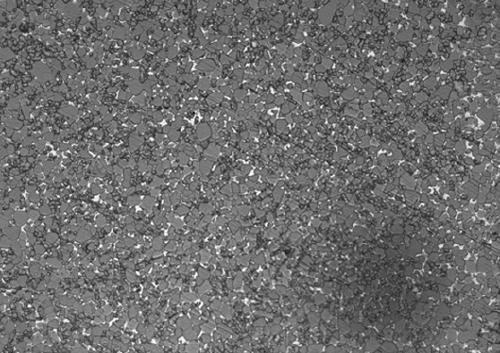Numerical control blade for heavy-load machining and preparation method thereof
A blade and mass fraction technology, applied in metal processing equipment, transportation and packaging, etc., can solve the problems of difficult balance between toughness and hardness of materials, low toughness, and increased cost, so as to meet the performance requirements of cutting tools, reduce magnetic saturation, and improve durability. The effect of grinding performance
- Summary
- Abstract
- Description
- Claims
- Application Information
AI Technical Summary
Problems solved by technology
Method used
Image
Examples
Embodiment 1
[0033] This embodiment provides a method for preparing a CNC blade for heavy-duty machining, the steps of which are as follows:
[0034] S1. Take Co, TNC8, TiCN, (TI, W) C and WC respectively, wherein the mass fraction of Co is 8%, the mass fraction of TNC8 is 3.8%, and the mass fraction of TiCN is 0.8%, (TI, W) The mass fraction of C is 4.4%;
[0035] S2. The raw materials weighed in step S1 are added with 2% polyethylene glycol by weight of the raw materials, mixed evenly, and put into an inclined ball mill for ball milling for 15 hours;
[0036] S3 is granulated and pressed in the mixture obtained by ball milling in step S2, and then sintered. The sintering process is as follows: put the material into a sintering furnace with a hydrogen atmosphere, and heat up from 25°C to 180°C at a uniform speed for the first 30 minutes, and then heat up at a constant speed for 30 minutes. to 310°C, followed by 60min uniform heating to 370°C, then 270min uniform heating to 380°C, then 12...
Embodiment 2
[0039] This embodiment provides a method for preparing a CNC blade for heavy-duty processing, the steps of which are as follows:
[0040] S1. Take Co, TNC8, TiCN, (TI, W) C and WC respectively, wherein the mass fraction of Co is 8%, the mass fraction of TNC8 is 3.8%, and the mass fraction of TiCN is 0.8%, (TI, W) The mass fraction of C is 4.4%;
[0041] S2. The raw material weighed in step S1 is added to the polyethylene glycol of 2% by weight of the raw material, and after mixing evenly, put it into an inclined ball mill for ball milling for 13 hours, and mix the ball-milled powder evenly;
[0042]S3 is granulated and pressed in the mixture obtained by ball milling in step S2, and then sintered. The sintering process is as follows: put the material into a sintering furnace with a hydrogen atmosphere, and heat up from 25°C to 180°C at a uniform speed for the first 30 minutes, and then heat up at a constant speed for 30 minutes. to 310°C, followed by 60min uniform heating to 3...
Embodiment 3
[0045] This embodiment provides a method for preparing a CNC blade for heavy-duty machining, the steps of which are as follows:
[0046] S1. Take Co, TNC8, TiCN, (TI, W) C and WC respectively, wherein the mass fraction of Co is 8%, the mass fraction of TNC8 is 3.8%, and the mass fraction of TiCN is 0.8%, (TI, W) The mass fraction of C is 4.4%;
[0047] S2. The raw material weighed in step S1 is added to the polyethylene glycol of 2% by weight of the raw material, and after mixing evenly, put it into an inclined ball mill for ball milling for 11 hours, and mix the ball-milled powder evenly;
[0048] S3 is granulated and pressed in the mixture obtained by ball milling in step S2, and then sintered. The sintering process is as follows: put the material into a sintering furnace with a hydrogen atmosphere, and heat up from 25°C to 180°C at a uniform speed for the first 30 minutes, and then heat up at a constant speed for 30 minutes. to 310°C, followed by 60min uniform heating to 3...
PUM
| Property | Measurement | Unit |
|---|---|---|
| thickness | aaaaa | aaaaa |
| hardness | aaaaa | aaaaa |
| hardness | aaaaa | aaaaa |
Abstract
Description
Claims
Application Information
 Login to View More
Login to View More - R&D
- Intellectual Property
- Life Sciences
- Materials
- Tech Scout
- Unparalleled Data Quality
- Higher Quality Content
- 60% Fewer Hallucinations
Browse by: Latest US Patents, China's latest patents, Technical Efficacy Thesaurus, Application Domain, Technology Topic, Popular Technical Reports.
© 2025 PatSnap. All rights reserved.Legal|Privacy policy|Modern Slavery Act Transparency Statement|Sitemap|About US| Contact US: help@patsnap.com



